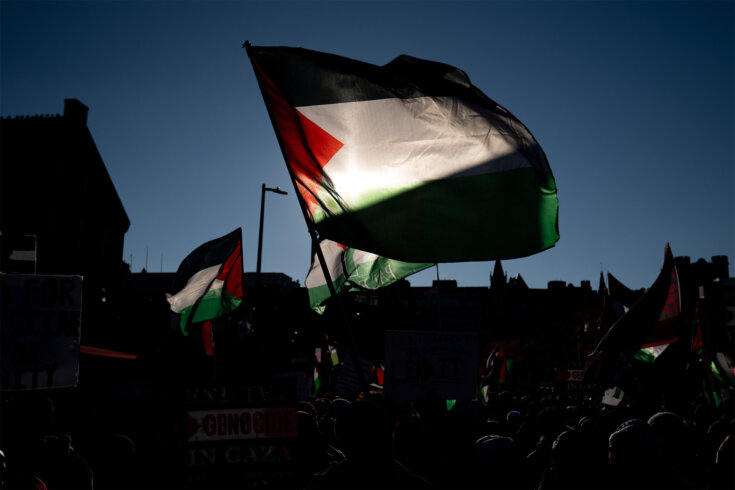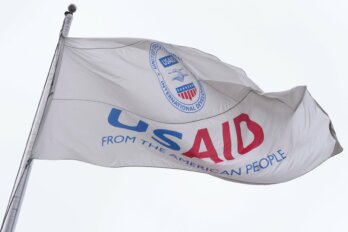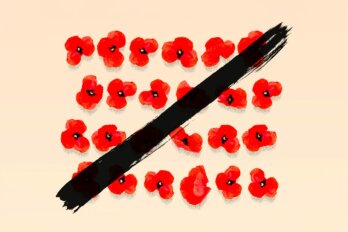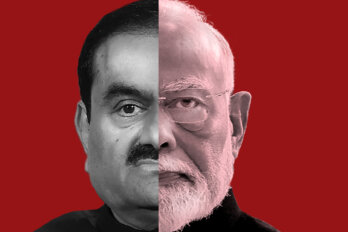“B ørn i Gaza har ret til et liv!”
It’s a late November afternoon in a gloomy Copenhagen, where I’m visiting friends for a few days, and the only reason I know what those Danish words mean is that I’m one of the protesters walking down H. C. Andersens Boulevard. I’m surrounded by a sea of bobbing heads covered in black and white checkered keffiyehs and raised arms waving Palestinian flags. There are thousands of us marching and chanting that, yes, children in Gaza have a right to life. Faces that look like mine acknowledge me with smiles of recognition, and kernels of Arabic pop around me with such frequency that I can’t take them all in.
Some of the banners and placards are in English, and they read “Ceasefire now!” or “Stop the massacre!” or, one of my favourites, “Palestine will never die!” By the time we get to Christiansborg Palace square, it starts to rain, but no one seems to mind, and I haven’t felt this kind of communal warmth in a long time.
I photograph a protester standing on the roof of a parked car, holding a glowing red flare in the air. As I prepare to post the image on Instagram, I look at my friends—one is Lebanese Canadian, one is Jordanian American—and ask, “Too much? Will people in Canada think I’ve been radicalized?” But I don’t wait for their answers because I realize I don’t like that I’m even asking these questions. I press “Share.”
A few weeks prior, on October 8, 2023—the day after Hamas led an armed attack on Israel, resulting in the massacre of 1,200 and the abduction of 240 hostages, mostly civilians—my partner warned me, “Be careful what you say publicly right now.” I knew what he meant and why that was the first thing he said to me when we learned of the news. But anyone who’d been paying attention to this issue knew what would follow: a brutal and merciless retaliation, eventually escalating to war and what many experts are now calling a genocide. For the first time in my adult life, I no longer cared whether expressing solidarity with the Palestinian people would affect my career or friendships.
That same day, I posted on Instagram a digital illustration of a young girl in front of a Palestinian flag, with the words “Free Palestine” in bold white letters above her. In the face of Israel’s impending counterattack, my expression of support felt like a helpless plea. The Nakba, or catastrophe, refers to the forced and violent displacement of 750,000 Palestinians during the 1948 Arab Israeli war. For seventy-five years, an entire people have been stripped of their human rights while living under occupation. The oppressive military system of rule has included policies of arbitrary punishment, land confiscations, and a goods blockade, altering every aspect of daily life such as mobility, association, and even access to electricity and clean water. Now there are roughly 7 million Palestinians in the diaspora. Whenever I say “Free Palestine,” I mean that I want Palestinians to be afforded basic humanity, to have safety, autonomy, and dignity—all rights that Israel’s military response has further obliterated in the name of eliminating Hamas.
But some see statements like mine as threatening and offensive. A recent CBC piece, published on December 22, 2023, describes the “chilling effect” on professionals in various sectors who have expressed their support for Palestinians. On November 10, 2023, The Maple published a list of seventeen people who had allegedly been fired for their pro-Palestine views, including Hamilton, Ontario, MPP Sarah Jama, who was ejected from the provincial NDP caucus. And so, for me, standing up for Palestinians in any way—even if it’s only on social media—is meaningful, precisely because of these kinds of attempts at silencing.
When I immigrated from Morocco roughly twenty years ago, I studied at Montreal’s Concordia University and made friends of different ethnicities and faiths. I quickly learned that in Canada, censorship is enforced politely, indirectly. You learn to read the room. You change the subject when none of your new Canadian university friends say anything as you bring up Palestinian resistance over dinner, when the mood becomes tense and you realize you and “the Palestine issue” are a bummer. Now, staying silent to avoid trouble feels painful, if not cowardly.
But four months into the war, I still can’t shake off the feeling that, somehow, I’m being censored—even if it’s a default self-censorship. That if I want to continue succeeding in this country, and especially in the journalism industry, I need to think long and hard about what and who I admit I am aligned with. This is the first time I put words on paper articulating these complicated thoughts and feelings and submit them for publication in a national outlet. I know others who understandably still don’t want to take the risk of a public backlash.
While I can’t remember the exact date, I have a vivid memory of my family sitting in front of the TV in Morocco, where I grew up, transfixed by the news of Palestinians being attacked once again during Ramadan. My mother crying. My father’s eyebrows furrowed. The rhetorical question that no one asked out loud: Why could we break our fast in peace and they couldn’t? At the time, I didn’t understand the depth of my parents’ feelings, I also didn’t know yet that while my family calls it Palestine, it’s not officially recognized by the majority of the world as a country. But I gathered that these people are my people too. That their pain is our pain. We’re one ummah.
October 7, 2023, was a day of horror. Of course I care about the trauma that has been inflicted on Israeli civilians and Jews around the world, and I empathize with their suffering. But history has been good at repeating itself when it comes to Palestinians. This is why I am pulled towards expressing worry about their plight and why I am for their resistance.
It’s obvious that for my Arab and Jewish friends, focusing on work right now is almost impossible. I keep in touch with one of my close friends, a Jewish woman, more than usual. We get on the phone when the words in text messages just don’t cut it, don’t carry the feelings of woe and helplessness. We lament about how it’s suddenly so hard to talk to people, to connect. We’re both grateful that we understand each other. I ask her directly whether she feels insulted by my “Free Palestine” Instagram post. “I know you, so no. But I can see how it might land badly with others,” she replies.
I fly back to Montreal days after the protest in Copenhagen and make my way to the Eastern Townships, where I live. In this small Franco Canadian town of roughly 11,000 people, the only other Arabs I’ve come across are two young Moroccan men who work at the lone McDonald’s there. When I go in for a Big Mac after my return to Canada, they smile at me in recognition and call me “sister.” I’ve gone back after that specifically to say hi. I don’t verbalize to anyone the loneliness I experience while thinking about what will come of the Palestinians in Gaza when I’m one of the only visible Arabs in town. I’m reminded that I still haven’t figured out how to maintain community in this country that replicates the feeling of belonging I have when I go back for a visit to Morocco.
The divisive, emotional reactions to social media statements of Palestinian support can also lead to broken friendships; I’ve experienced this myself, and I know others have too. The current atmosphere reminds me of the height of the pandemic, when so many of us felt compelled to declare our allegiance. Pro-mask or anti-mask? Vaccinated or antivaxxer? Then, like today, you were either on one side or the other, and your friends either thought like you did or they were no longer your friends. I wonder if we’ll ever be able to think beyond taking sides. If being pro-justice and equity will ever feel less lonely.




